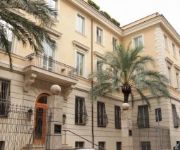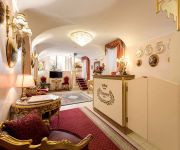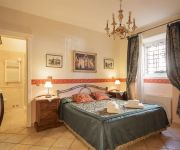Safety Score: 3,0 of 5.0 based on data from 9 authorites. Meaning we advice caution when travelling to Italy.
Travel warnings are updated daily. Source: Travel Warning Italy. Last Update: 2024-08-13 08:21:03
Delve into San Saba
The district San Saba of Rome in Province of Rome (Latium) is a subburb in Italy and is a district of the nations capital.
If you need a hotel, we compiled a list of available hotels close to the map centre further down the page.
While being here, you might want to pay a visit to some of the following locations: Ciampino, Tor Lupara, Marino, Frascati and Grottaferrata. To further explore this place, just scroll down and browse the available info.
Local weather forecast
Todays Local Weather Conditions & Forecast: 13°C / 56 °F
| Morning Temperature | 11°C / 52 °F |
| Evening Temperature | 13°C / 56 °F |
| Night Temperature | 15°C / 60 °F |
| Chance of rainfall | 1% |
| Air Humidity | 52% |
| Air Pressure | 1009 hPa |
| Wind Speed | Moderate breeze with 12 km/h (7 mph) from North-East |
| Cloud Conditions | Overcast clouds, covering 100% of sky |
| General Conditions | Light rain |
Friday, 22nd of November 2024
17°C (63 °F)
9°C (47 °F)
Light rain, fresh breeze, overcast clouds.
Saturday, 23rd of November 2024
11°C (52 °F)
8°C (47 °F)
Sky is clear, gentle breeze, clear sky.
Sunday, 24th of November 2024
11°C (53 °F)
9°C (49 °F)
Sky is clear, light breeze, clear sky.
Hotels and Places to Stay
Capo D'Africa
Caravel Centro Congressuale
Cilicia
Hotel Romance
Maison Colosseo
Pepoli9 Charming Guest House
Appartamenti MarcoAurelio49
Q Domus A Holiday Home
Karol Apartment Rome
Colosseum B
Videos from this area
These are videos related to the place based on their proximity to this place.
The Best & Worst of Rome - Five Things to Love & Hate About Visiting Rome, Italy
http://www.woltersworld.com Rome, the eternal city and my favorite capital in Europe. There is much to love about Rome, but there is even a few things you might not like. Regardless of the...
◄ Colosseum, Rome [HD] ►
Colosseum - HD footage, information and facts on the icon of ancient Rome; the Colosseum. The Colosseum was the Roman Empire's most impressive building. The ruins of the Colosseum have ...
Rome, Italy: Catacombs and Appian Way
Rome's San Callisto catacombs housed early Christian heroes later recognized as martyrs and saints as early as the 3rd century. Along with the catacombs, which were abandoned and forgotten...
Rome City Tour Highlights
Highlights of Rome on a city tour including Colosseum, Roman Forum, Trevi Fountain, Piazza Navona and St Peter;s Square in the Vatican City. Taken on an MS Cruises City tour for more visit...
Dji PHANTOM 2 OVER/AROUND/IN THE COLOSSEUM IN ROME
PLEASE WATCH in HD 1080 and full screen! My 2nd (daring) flight with Dji Phantom2 with Zenmuse gimbal 3H-2D and Gopro Hero 3+ Around, over, in the Colosseum in Rome! The Phantom of Rome ...
Shit Expats in Rome Say by Rome's Comedy Club
Opening night September 28th, 2012 at Grotta Pinta (via di grottapinta 12, near Campo). 8pm doors open 5 euro entrance fee for the show first drink paid includes aperitivo buffet 9pm show time...
◄ Appian Way, Rome [HD] ►
The Appian Way - HD footage, information and facts on the Appian Way, also known as Via Appia Antica. Via Appia is an ancient 520 kilometer long road from Rome to Brindisi in southeast Italy....
UHD Ultra HD 4K Video Stock Footage Rome Colosseum Famous Sightseeing Travel Landmark Day Night
Royalty-Free Stock Footage available in 4K 2160P (4096x2160) @23.976 ( Canon 1DC ), UHD Ultra HD (3840x2160) and HD 1080P (1920x1080) Facebook: https://www.facebook.com/sevartvideo ...
Piazza Mastai Centro Roma
Appartamento Trastevere Centro Storico di Roma "UNICO" - MQ.150 -Secondo piano - palazzetto in cortina d'epoca - Affaccio su Piazza Mastai Euro 1.050.000 per...
Videos provided by Youtube are under the copyright of their owners.
Attractions and noteworthy things
Distances are based on the centre of the city/town and sightseeing location. This list contains brief abstracts about monuments, holiday activities, national parcs, museums, organisations and more from the area as well as interesting facts about the region itself. Where available, you'll find the corresponding homepage. Otherwise the related wikipedia article.
Porta Capena
The Porta Capena was a gate in the Servian Wall near the Caelian Hill, in Rome, Italy according to Roman tradition the sacred grove where Numa Pompilius and the nymph Egeria used to meet. It was one of the main entries to the city of Rome, since it opened on the Appian Way. The origin of the name is unknown, although it may refer to the fact that the road leads to Capua, an important city in Campania, south of Rome.
Baths of Caracalla
The Baths of Caracalla (Italian: Terme di Caracalla) in Rome, Italy, were the second largest Roman public baths, or thermae, built in Rome between AD 212 and 216, during the reign of the Emperor Caracalla. Chris Scarre provides a slightly longer construction period 211-217 AD. They would have had to install over 2,000 tons of material every day for six years in order to complete it in this time.
Caelian Hill
The Caelian Hill (Latin Collis Caelius, Italian Celio) is one of the famous Seven Hills of Rome. Under reign of Tullus Hostilius, the entire population of Alba Longa was forcibly resettled on the Caelian Hill. According to a tradition recounted by Titus Livy, the hill received its name from Caelius Vibenna, either because he established a settlement there or because his friend Servius Tullius wished to honor him after his death.
San Saba, Rome
San Saba is an ancient basilica church in Rome, Italy. It lies on the so-called Piccolo Aventino, which is an area close to the ancient Aurelian Walls next to the Aventine and Caelian Hill. The current Cardinal Deacon of the Titulus S. Sabae is Jorge Medina Estévez. The titulus was established in 1959.
Premonstratensian
The Order of Canons Regular of Prémontré, also known as the Premonstratensians, the Norbertines, or in Britain and Ireland as the White Canons (from the colour of their habit), are a Roman Catholic religious order of canons regular founded at Prémontré near Laon in 1120 by Saint Norbert, who later became Archbishop of Magdeburg. Premonstratensians are designated by O. Praem (Ordo Praemonstratensis) following their name.
Aurelian Walls
The Aurelian Walls are a line of city walls built between 271 AD and 275 AD in Rome, Italy, during the reign of the Roman Emperors Aurelian and Probus. The walls enclosed all the seven hills of Rome plus the Campus Martius and, on the right bank of the Tiber, the Trastevere district. The river banks within the city limits appear to have been left unfortified, although they were fortified along the Campus Martius.
Celio (rione of Rome)
Celio is the XIXth rione of Rome. Its logo is the bust of an African, with an elephant headdress with golden tusks on a silver background, in memory of an African bust that was found in via Capo d'Africa.
San Saba (rione of Rome)
San Saba is the XXI rione of Rome. It was named after the Basilica of San Saba, which lies there.
Santi Nereo e Achilleo
Santi Nereo e Achilleo is a fourth-century basilica church in Rome, Italy, located in via delle Termi di Caracalla in the rione Celio facing the main entrance to the Baths of Caracalla. The current Cardinal Priest of the Titulus Ss. Nerei et Achillei is Theodore Edgar McCarrick.
Santa Balbina
Santa Balbina is a basilica church in Rome, devoted to St. Balbina. It was built in the 4th century over the house of consul Lucius Fabius Cilo on the Aventine Hill, behind the Baths of Caracalla. Possibly the ancient Titulus Tigridae, the basilica was consecrated by Pope Gregory I. The adjoining monastery has a commanding medieval defence tower. Inside the basilica there is a very fine episcopal chair with a Cosmatesque decoration from the 13th century.
San Sisto Vecchio
San Sisto Vecchio is a church in Rome, devoted to St. Pope Sixtus II. It was built in the 4th century, and is recorded as the Titulus Crescentianae, thus relating the church to some Crescentia, possibly a Roman woman who founded the church. According to tradition, the church was established by Pope Anastasius I (399-401). The church houses the relics of St. Pope Sixtus II, transferred here from the Catacombs of St. Callixtus in the 6th century.
San Giovanni in Oleo
San Giovanni in Oleo is a small church in Rome, Italy, devoted to Saint John the Evangelist, on the place where, according to tradition, his martyrdom was attempted. According to an ancient tradition, in 92, St. John survived martyrdom through immersion in a vat of boiling oil, attempted by Domitian himself.
San Gregorio Magno al Celio
San Gregorio Magno al Celio, also known as San Gregorio al Celio or simply San Gregorio, is a church in Rome, Italy, which is part of a monastery of monks of the Camaldolese branch of the Benedictine Order. St. Augustine of Canterbury and his Benedictines were sent by Pope Saint Gregory the Great, the basilica's namesake and patron saint, to evangelize England in 597 AD.
Santo Stefano Rotondo
The Basilica of St. Stephen in the Round on the Celian Hill (Italian: Basilica di Santo Stefano al Monte Celio, Latin: Basilica S. Stephani in Coelio Monte) is an ancient basilica and titular church in Rome, Italy. Commonly named Santo Stefano Rotondo, the church is the National church in Rome of Hungary dedicated to Saint Stephen and Saint Stephen of Hungary. The minor basilica is also the rectory church of the Pontifical Collegium Germanicum et Hungaricum. The Cardinal Priest or titular S.
Porta San Sebastiano
Porta San Sebastiano is the modern name for the ancient Porta Appia, a gate in the Aurelian Wall of Rome, through which the Via Appia, now the Via di Porta San Sebastiano at that location, left the city in a southeasterly direction. It was refortified at the end of the 4th century and was again renovated in the sixth century by Belisarius and Narses. The gate, a brick structure with turrets, still stands and has been restored to good condition. Modern traffic flows under it.
Arch of Drusus
The Arch of Drusus is an ancient arch in Rome, Italy, close to the First Mile of the Appian Way and next to the Porta San Sebastiano. The exact origins of the Arch are unclear. It is now generally agreed that it has nothing to do with Nero Claudius Drusus, the conqueror of the Germans. Some versions have the arch being constructed as part of a spur added to the Aqua Marcia by Caracalla in 211-216 AD to take water from that aqueduct to Caracalla’s new baths.
Santa Maria in Domnica
Santa Maria in Domnica — also known as Santa Maria alla Navicella — is a basilica church in Rome. The current Cardinal Deacon of the Titulus S. Mariae in Domnica is William Joseph Levada.
San Giovanni a Porta Latina
San Giovanni a Porta Latina is a Basilica church in Rome, Italy, near the Porta Latina of the Aurelian Wall. It is currently the titular church of Cardinal Franciszek Macharski, former Archbishop of Kraków.
San Cesareo in Palatio
San Cesareo in Palatio or San Caesareo de Appia is a titular church in Rome, near the beginning of the Appian Way. It is dedicated to Saint Caesarius of Africa, a 2nd century deacon and martyr.
Santi Giovanni e Paolo, Rome
Santi Giovanni e Paolo is an ancient basilica church in Rome, located on the Celian Hill. It is also called Santi Giovanni e Paolo al Celio or referred to as SS Giovanni e Paolo. The church was built in 398, by will of senator Pammachius, over the home of two Roman soldiers, John and Paul, martyred under Julian in 362. The church was thus called the Titulus Pammachii and is recorded as such in the acts of the synod held by Pope Symmachus in 499.
Tomb of the Scipios
The Tomb of the Scipios (Latin sepulcrum Scipionum), also called the hypogaeum Scipionum, was the common tomb of the patrician Scipio family during the Roman Republic for interments between the early 3rd century BC and the early 1st century AD. Then it was abandoned and its location was lost within a few hundred years.
Villa Mattei
The Villa Mattei or Villa Celimontana is a villa on the Caelian Hill in Rome, best known for its gardens. Its grounds cover most of the valley between the Aventine Hill and the Caelian.
Circo Massimo (Rome Metro)
Circo Massimo is a station on Line B of the Rome Metro. It was opened on 10 February 1955 and is sited at the east end of the Circus Maximus, after which it is named, near the headquarters of the FAO, originally built as the Ministero delle Colonie. Until 2002 the Obelisk of Axum also stood near the station. It has two separate exits on either side of the viale Aventino.
San Tommaso in Formis
The church of San Tommaso in Formis is a small church in Rome, situated on the Caelian Hill.
David Lubin Memorial Library
The David Lubin Memorial Library is the main library of the Food and Agriculture Organization of the United Nations (FAO). Its world renowned collection consists of technical material related to food, nutrition, agriculture, forestry and fisheries, with emphasis on developing countries. The core of its historical collection is the library of the International Institute of Agriculture (IIA), whose assets were entrusted to FAO when the IIA was disbanded in 1946.














!['◄ Colosseum, Rome [HD] ►' preview picture of video '◄ Colosseum, Rome [HD] ►'](https://img.youtube.com/vi/4WphJnTNGPM/mqdefault.jpg)




!['◄ Appian Way, Rome [HD] ►' preview picture of video '◄ Appian Way, Rome [HD] ►'](https://img.youtube.com/vi/LkIMjtfAj1s/mqdefault.jpg)








